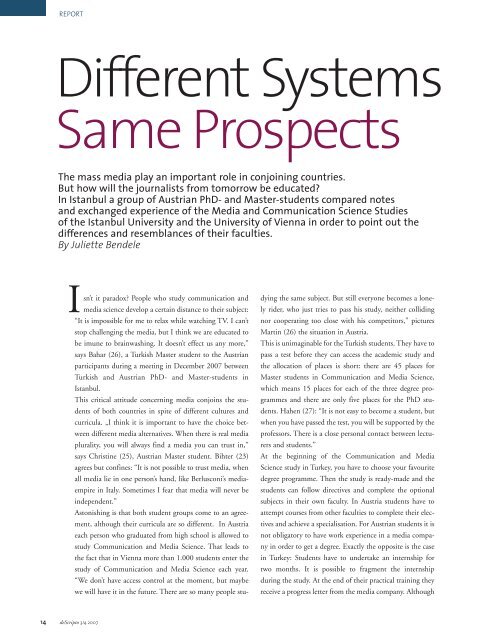DOSSIER
DOSSIER
DOSSIER
You also want an ePaper? Increase the reach of your titles
YUMPU automatically turns print PDFs into web optimized ePapers that Google loves.
REPORT<br />
Different Systems<br />
Same Prospects<br />
The mass media play an important role in conjoining countries.<br />
But how will the journalists from tomorrow be educated?<br />
In Istanbul a group of Austrian PhD- and Master-students compared notes<br />
and exchanged experience of the Media and Communication Science Studies<br />
of the Istanbul University and the University of Vienna in order to point out the<br />
differences and resemblances of their faculties.<br />
By Juliette Bendele<br />
Isn’t it paradox? People who study communication and<br />
media science develop a certain distance to their subject:<br />
“It is impossible for me to relax while watching TV. I can’t<br />
stop challenging the media, but I think we are educated to<br />
be imune to brainwashing. It doesn’t effect us any more,”<br />
says Bahar (26), a Turkish Master student to the Austrian<br />
participants during a meeting in December 2007 between<br />
Turkish and Austrian PhD- and Master-students in<br />
Istanbul.<br />
This critical attitude concerning media conjoins the students<br />
of both countries in spite of different cultures and<br />
curricula. „I think it is important to have the choice between<br />
different media alternatives. When there is real media<br />
plurality, you will always find a media you can trust in,”<br />
says Christine (25), Austrian Master student. Bihter (23)<br />
agrees but confines: “It is not possible to trust media, when<br />
all media lie in one person’s hand, like Berlusconi’s mediaempire<br />
in Italy. Sometimes I fear that media will never be<br />
independent.”<br />
Astonishing is that both student groups come to an agreement,<br />
although their curricula are so different. In Austria<br />
each person who graduated from high school is allowed to<br />
study Communication and Media Science. That leads to<br />
the fact that in Vienna more than 1.000 students enter the<br />
study of Communication and Media Science each year.<br />
“We don’t have access control at the moment, but maybe<br />
we will have it in the future. There are so many people stu-<br />
14 deScripto 3/4 2007<br />
dying the same subject. But still everyone becomes a lonely<br />
rider, who just tries to pass his study, neither colliding<br />
nor cooperating too close with his competitors,” pictures<br />
Martin (26) the situation in Austria.<br />
This is unimaginable for the Turkish students. They have to<br />
pass a test before they can access the academic study and<br />
the allocation of places is short: there are 45 places for<br />
Master students in Communication and Media Science,<br />
which means 15 places for each of the three degree programmes<br />
and there are only five places for the PhD students.<br />
Hahen (27): “It is not easy to become a student, but<br />
when you have passed the test, you will be supported by the<br />
professors. There is a close personal contact between lecturers<br />
and students.”<br />
At the beginning of the Communication and Media<br />
Science study in Turkey, you have to choose your favourite<br />
degree programme. Then the study is ready-made and the<br />
students can follow directives and complete the optional<br />
subjects in their own faculty. In Austria students have to<br />
attempt courses from other faculties to complete their electives<br />
and achieve a specialisation. For Austrian students it is<br />
not obligatory to have work experience in a media company<br />
in order to get a degree. Exactly the opposite is the case<br />
in Turkey: Students have to undertake an internship for<br />
two months. It is possible to fragment the internship<br />
during the study. At the end of their practical training they<br />
receive a progress letter from the media company. Although

















